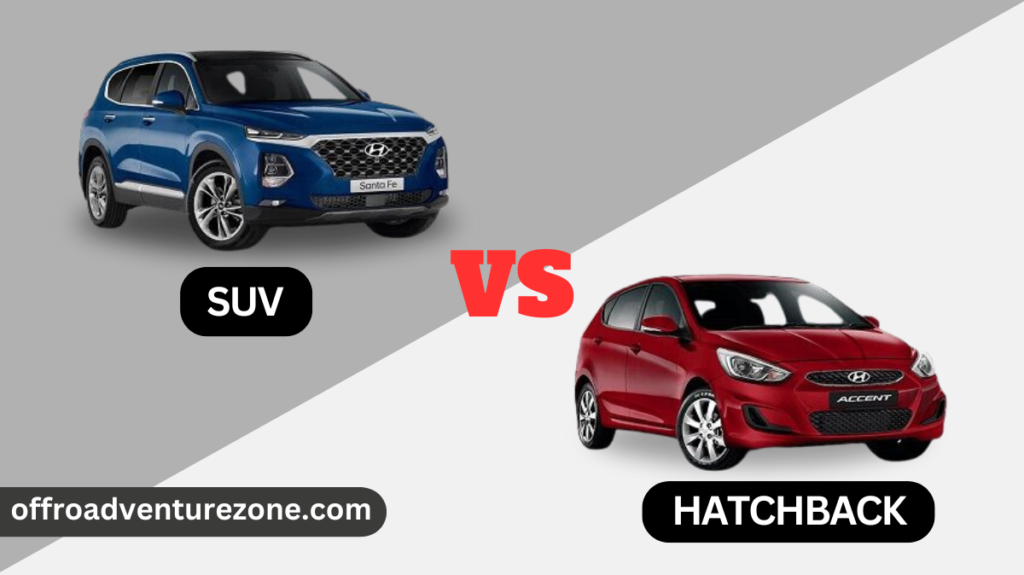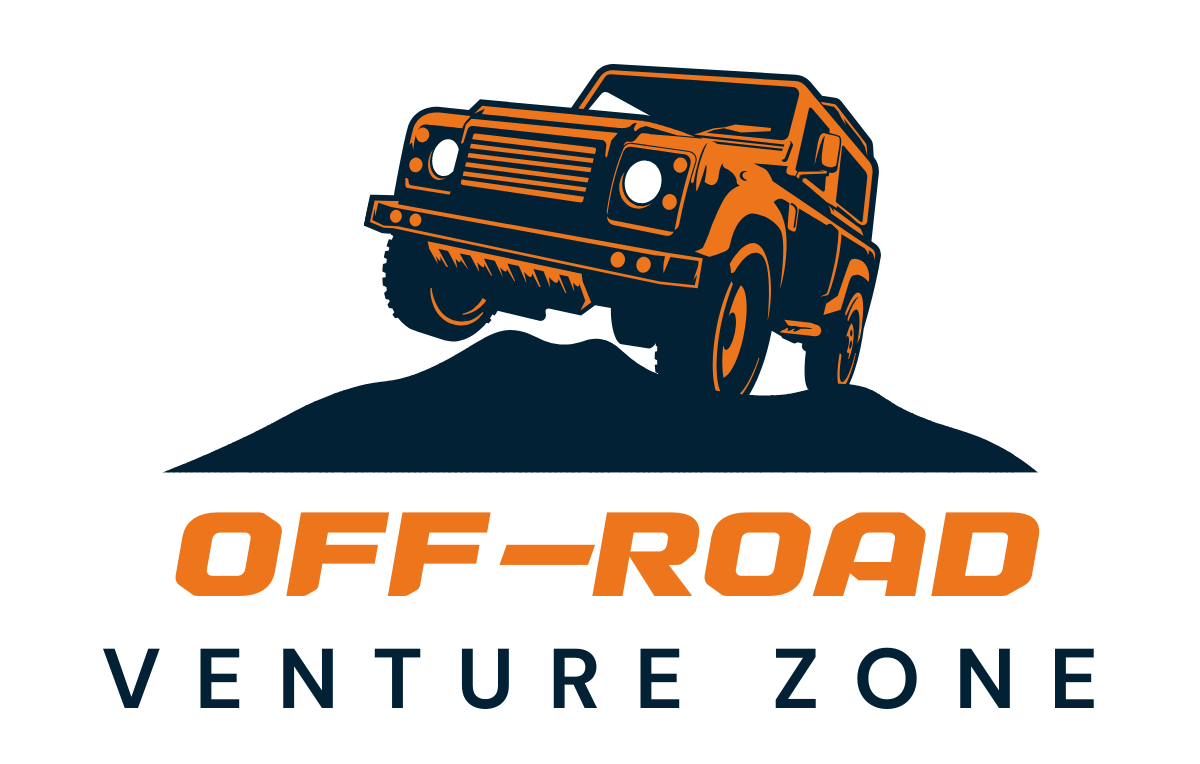When it comes to choosing a vehicle, two of the most popular types of cars are SUVs (Sport Utility Vehicles) and hatchbacks. Both have their own unique features, advantages, and disadvantages.
But how do you know which one is right for you? We will break down the differences between SUVs and hatchbacks in various important aspects such as performance, comfort, fuel efficiency, safety, and more.

Contents
SUV vs Hatchback Vehicle
Main difference between SUVs and hatchbacks lies in their size and purpose. SUVs are larger vehicles with higher ground clearance, built for both city and rough terrain. Hatchbacks are smaller cars with a rear door that opens upward, perfect for city driving and easy parking.
Now, let’s create a detailed comparison table for SUV vs Hatchback Vehicle:
| Feature | SUV | Hatchback |
| Size | Big and tall | Small and compact |
| Seating | 5-7 people | 4-5 people |
| Ground clearance | High | Low |
| Fuel use | Uses more fuel | Uses less fuel |
| Parking | Harder to park | Easy to park |
| Storage space | Large cargo area | Medium cargo area |
| Safety | Better in crashes | Good in city driving |
| Price | More expensive | Less expensive |
| Best for | Family trips, rough roads | City driving, daily use |
In summary: If you want a smaller car that’s easy to drive and park, and doesn’t use much fuel, choose a hatchback. But if you need more space for family, like to travel on rough roads, and don’t mind spending more money, an SUV might be better for you.
What is an SUV?
An SUV, or Sports Utility Vehicle, is a larger car with a strong engine. It is built to handle rough roads, carry more people, and hold a lot of luggage. SUVs are good for families and people who like to travel off the beaten path. These cars usually sit higher off the ground, making them better for uneven roads or challenging weather like snow and rain.
What is a Hatchback?
A hatchback is a smaller car with a rear door that swings upward. It is perfect for city driving and everyday use. Hatchbacks are great for people who want a simple, easy-to-drive car. While they’re not as powerful as SUVs, they are known for their efficiency and ease of handling. Their compact size makes them ideal for crowded streets and small parking spaces.
Terrain and Performance
SUVs: Strong and Ready for Adventure
SUVs are made to handle all kinds of roads. They can drive on bumpy paths, in mud, or even snow. Most SUVs have powerful engines and special features like four-wheel drive, which helps them drive better on tricky surfaces.
This makes them a favorite for people who love outdoor adventures. Whether you’re camping in the mountains or taking a road trip, an SUV can handle it.
SUVs also perform well on highways. Their powerful engines make overtaking other cars easy, and they feel stable at high speeds. However, their large size can make them a bit harder to drive in small or crowded areas.
Hatchbacks: Smooth and Easy in the City
Hatchbacks are designed for smooth roads. They are not meant for off-road adventures but are great for driving in cities. Their smaller size helps them fit into tight parking spots and zip through traffic easily.
Hatchbacks are a good choice for everyday use on paved roads. They handle well and can be quite fun to drive, especially for people who enjoy quick and responsive steering.
While they may not be the best choice for rough terrain, hatchbacks are perfect for running errands, commuting to work, or taking short trips. They are also more affordable to maintain because their parts and repairs often cost less.
Comfort and Space
SUVs: Big and Roomy
SUVs have a lot of space. They can carry many passengers and still have room for luggage. The seats are higher, giving drivers a great view of the road. This makes them comfortable for long drives.
Families love SUVs because they can fit everyone and everything comfortably. Some SUVs even have three rows of seats, allowing them to carry up to seven or eight passengers.
Inside, SUVs often have features like adjustable seats, climate control, and entertainment systems to keep everyone happy on long trips. The extra space also makes it easy to bring pets, sports equipment, or camping gear.
Hatchbacks: Small but Smart
Hatchbacks may be smaller, but they are designed to use space well. The back seats can often fold down to make room for more luggage. While they don’t have as much room as SUVs, they are perfect for short trips and city driving. Their compact interiors are still comfortable, with enough legroom for passengers in the front and back.
Hatchbacks also make loading and unloading items easy because of their hatch-style trunk. This design is handy for carrying groceries, small furniture, or luggage for a weekend trip. While they’re not as luxurious as SUVs, hatchbacks are practical and efficient.
Fuel Efficiency
SUVs: More Power, More Fuel
SUVs use more fuel because they have bigger engines and are heavier. While some newer SUVs are improving in this area, they still cost more to fuel compared to hatchbacks.
If you drive long distances or use your car a lot, the fuel costs for an SUV can add up quickly. However, hybrid and electric SUVs are becoming more common, offering better fuel economy and lower emissions.
Hatchbacks: Light and Economical
Hatchbacks are lighter and have smaller engines. This means they use less fuel, saving you money in the long run. If you want a car that is cheaper to run, a hatchback is a great option. Many hatchbacks can travel long distances on a single tank of gas, making them ideal for budget-conscious drivers.
Hatchbacks are also better for the environment because they produce fewer emissions. If you care about reducing your carbon footprint, a hatchback is a smart choice.
Safety
SUVs: Strong and Sturdy
SUVs are big and strong, which helps protect passengers in accidents. Many SUVs come with advanced safety features like cameras, airbags, and systems to prevent skidding. This makes them a good choice for families who prioritize safety. Their size also makes them more visible on the road, which can reduce the chances of collisions.
Hatchbacks: Safe and Simple
Hatchbacks are also safe, with features like airbags and anti-lock brakes. Their smaller size makes them easier to control, which can help prevent accidents in tight spaces.
While not as tough as SUVs, they still provide good protection. Modern hatchbacks often include advanced safety technology like lane departure warnings and automatic emergency braking.
Practicality and Versatility
SUVs: Perfect for Families and Trips
SUVs can carry a lot, whether it’s people or luggage. This makes them great for road trips, camping, or carrying big items. If you often need to transport a lot of things, an SUV is a practical choice. Their versatility also extends to towing trailers or boats, which is something hatchbacks cannot do.
Hatchbacks: Easy for Daily Use
Hatchbacks are compact, making them perfect for daily errands. Their small size makes parking and driving in busy areas easy. If you’re looking for a car for commuting or short trips, a hatchback is very convenient. They’re also easy to maintain, with repairs often being quicker and cheaper compared to SUVs.
Durability and Longevity
SUVs: Built to Last
SUVs are tough and can handle more wear and tear. This makes them a good long-term investment, especially if you plan to use them on rough roads. With regular maintenance, an SUV can last for many years and still perform well.
Hatchbacks: Reliable for Everyday Driving
Hatchbacks are reliable cars for daily use. They may not last as long in rough conditions, but with proper care, they can serve you well for many years. Hatchbacks are known for their durability in city driving and are less expensive to repair if something goes wrong.
Driving Experience for Beginners
SUVs: A Bit Challenging
For new drivers, SUVs can feel big and hard to handle at first. However, many SUVs have helpful features like parking sensors and cameras to make driving easier. With time and practice, even beginners can feel comfortable driving an SUV.
Hatchbacks: Easy and Friendly
Hatchbacks are great for beginners. Their smaller size and easy handling make them simple to drive. This is why many first-time drivers choose hatchbacks. They’re less intimidating and easier to park, especially in tight spaces.
Resale Value
SUVs: High Demand
SUVs often keep their value because they are popular and practical. This means you can sell them at a good price when you’re ready for a new car. Features like all-wheel drive and advanced technology also make SUVs attractive in the used car market.
Hatchbacks: Steady Value
Hatchbacks also have good resale value, especially models that are fuel-efficient. They’re affordable and appealing to many buyers. If you take good care of your hatchback, you can expect a fair price when selling it.
Technology Features
SUVs: Packed with Gadgets
SUVs often come with the latest technology. This includes touchscreens, GPS, and features that help with driving, like lane-keeping assist. These high-tech features make SUVs very appealing. They also often have premium sound systems and entertainment options for passengers.
Hatchbacks: Simple but Modern
Hatchbacks come with all the basics, like Bluetooth, USB ports, and easy-to-use touchscreens. While they may not have as many gadgets as SUVs, they have everything you need for a comfortable ride. Hatchbacks are ideal for people who want modern features without the extra cost.
Costs and Ratings
| Vehicle Type | Average User Rating | Starting Cost ($) | Key Features |
| SUV | ⭐⭐⭐⭐⭐ 4.5 | 30,000 | Spacious, off-road capable |
| Hatchback | ⭐⭐⭐⭐⭐ 4.3 | 20,000 | Compact, fuel-efficient, practical |
Conclusion
Both SUVs and hatchbacks have their strengths. If you need a big car for your family or love outdoor adventures, an SUV might be the best choice.
But if you want a small, affordable car for city driving, a hatchback is perfect. Think about your needs, budget, and how you plan to use your car. This will help you choose the right one.
Are SUVs harder to drive than hatchbacks?
SUVs can be harder to drive at first because they are bigger. But with practice, they become easier.
Which is cheaper to run, an SUV or a hatchback?
Hatchbacks are usually cheaper to run because they use less fuel.
Can a hatchback fit a family?
Hatchbacks can fit small families, but they might not have enough space for larger families.
Are SUVs better for long trips?
Yes, SUVs are better for long trips because they are more comfortable and have more space.
Which is safer, an SUV or a hatchback?
Both are safe, but SUVs offer extra protection due to their size and strength.
